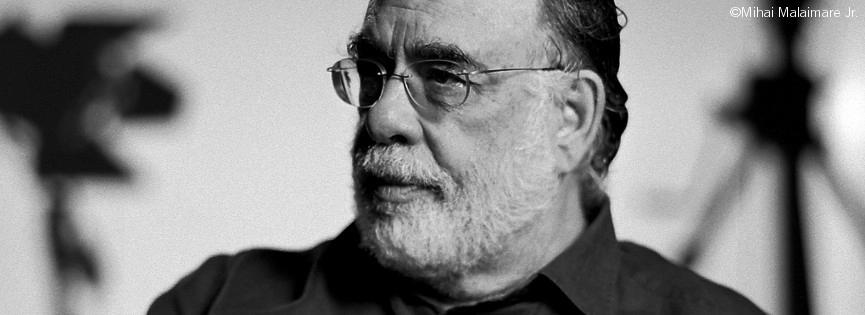Main content
Francis Ford Coppola 2015 Princess of Asturias Award for the Arts

Francis Ford Coppola (Detroit, Michigan, USA, 1939) grew up in New York in a home with ties to music and the cinema. His father, Carmine Coppola, was an instrumentalist and composer. His childhood was marked by polio, which kept him bedridden for over a year, but also by puppetry and editing family films in Super 8, which served as a both a distraction and a source of learning. He majored in Theater Arts at Hofstra College (New York) and studied film at the UCLA Film School, where he earned a Master in Fine Arts Degree with his thesis project You’re a Big Boy Now (1966). His wide-ranging body of work, which includes films considered classics in cinema history, comprises more than 30 films as director, 27 as screenwriter and 74 as producer. In 1969, he created the American Zoetrope production company, which produced the early works of George Lucas, among others.
Francis Ford Coppola is nowadays considered a master of the art of filmmaking. A visionary and innovator, Coppola has fully embraced the Wagnerian concept of the “total work of art”, in which nothing escapes the attentive scrutiny of the director and “his genuine resolve to make auteur films within the confines of the major studios”, in the opinion of specialists. His stance has sometimes clashed with the interests of the Hollywood industry, causing him both economic problems and difficulties when filming.
A thematic and formal renovator, Coppola’s explorations of the relationship between power and corruption and the horrors and absurdity of war have extended beyond his work as an artist, becoming universal, collective icons of contemporary imagination and culture. With Fellini, Antonioni, Kurosawa and Murnau as exemplars, Coppola rose to prominence in the world of filmmaking when he won his first Oscar in 1970 for Best Original Screenplay for Patton. However, the film that really made him a household name was The Godfather (1972), adapted from the novel by Mario Puzo. Shot in 52 days with a controversial cast, it became one of the blockbusters of its day, as well as winning three Oscars. Two years later, he shot the sequel, The Godfather: Part II, with a budget that doubled that of the previous film and for which he received numerous awards, including six Oscars. That same year he released The Conversation (1974), one of his most personal movies along with The Rain People (1969) and Tetro (2009), according to experts. Coppola ended the 1970s with the release of Apocalypse Now (1979), a free adaptation of Joseph Conrad’s novel Heart of Darkness. The film is included among the great masterpieces of cinema and had the largest budget in history at the time. In the 80s, he directed The Outsiders (1983), Rumble Fish (1983) –which served as a “stable” for a new generation of actors (including his nephew, Nicolas Cage, and his own daughter, Sofia Coppola)– and Peggy Sue Got Married (1986). In the 90s, he released The Godfather: Part III (1990) and Bram Stoker’s Dracula (1992), for which won three Oscars. At the Cannes Festival in 2001, he presented Apocalypse Now Redux, a new director’s cut with 49 minutes of unseen footage. His recent films as a director include Youth Without Youth (2007) and Twixt (2011).
Francis Ford Coppola’s films have frequently been nominated for and distinguished with the film industry’s most prestigious international awards. Besides the Oscars he has won, his work as a director, scriptwriter and producer has been recognized by Golden Globes (USA), the Palme d’Or at Cannes (France), the BAFTA Awards (UK), the César Awards (France), the David di Donatello Awards (Italy) and the Golden Lion (Italy). In 2013, he was bestowed with the Praemium Imperiale Award (Japan).
End of main content
